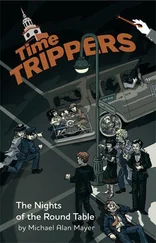“That’s all very well, Prévert, but how do you hope to conduct your case without your star witness? Surely you can’t hope to get Hartmann here?”
“I’m in the process of making the necessary arrangements.”
They stood in the Kurfürstendamm and looked across at the Gedächtniskirche. The sombre, smoke-blackened spire dominated the long street far more effectively than any of the new buildings with their glass and chromium façades. Its tortured, shattered silhouette seemed to claw the sky in a desperate effort to retain its equilibrium. No memorial could have been more melancholy or more mutely eloquent.
“Your hotel’s just across the street,” said Prévert. “I’ve reserved you a room with bath. You’ll find your bags already installed there, if I’m not mistaken.”
“First-rate planning,” remarked Kahlenberge. “I congratulate you.”
Arranging to meet in the hotel foyer at seven that evening, they shook hands grinning like a couple of old cronies indulging in a piece of youthful folly. Then Kahlenberge crossed the Kurfürstendamm to the hotel and Prévert got into his waiting car.
“Friedrichstrasse,” said Prévert. Friedrichstrasse lay in the Eastern sector of the city, but Prévert’s driver betrayed not the slightest surprise.
The car passed through the two check points at the Brandenburg Gate without incident, glided down the Unter den Linden and turned left into Friedrichstrasse. There, a few blocks beyond the Admiralspalast, it drew up in front of a bleak façade of grey stone broken by dim window-panes set in narrow, elongated embrasures and interspersed with unadorned but massive pillars—a piece of severely uniform architecture which had once been the lair of Prussian officialdom.
Once inside, Prévert turned into what he was, a senior administrator of the prestigious Sûreté and an Interpol co-ordinator. In this capacity, he was admitted into the presence of Commissioner Karpfen of the East German Ministry of the Interior. These days, policemen were the only civil servants in the world with any real community of purpose, and then only where capital crimes were concerned.
A lengthy discussion on professional matters developed between the two international police experts. They swapped information on the rapid comparison of finger-print records, moved on to possible methods of tightening up communication procedures and ended by discoursing—semi-officially, now—on narcotics and the use of lie-detectors.
Prévert skilfully fostered an atmosphere of insidious familiarity because he was aware of Commissioner Karpfen’s weaknesses and was clever enough to interpret them as an indirect source of strength. Herr Karpfen, round as a rubber ball but endowed with the wrinkled physiognomy of a sad-faced clown, warmed to his visitor, flattered that his almost legendary colleague from Paris was treating him like an intimate friend.
“I don’t have anything to do with politics,” Karpfen declared with spirit. Then, alarmed at his own temerity, he back-pedalled vigorously and nipped this perilous line of thought in the bud by adding: “Though I’m fundamentally a political animal, of course, and as such I’m a staunch upholder of democratic ideals.”
“But you’re a policeman first and foremost.”
“True,” Karpfen conceded.
“And if we lend each other a helping hand it’s purely for reasons of professional solidarity?”
“What else are colleagues for?”
“Then tell me,” said Prévert, folding his hands like a man in prayer. “You had a particularly gruesome sex murder in Dresden the other day, didn’t you?”
Karpfen looked surprised. “Where did you hear that?”
“Come now, Commissioner, we hardly need explain the nature of our information services to each other, need we?”
The Commissioner made a gesture of resignation. There were certain things which had to be accepted. “It’s a fundamental principle of ours not to suppress information, but we are equally careful not to divulge it prematurely. After all, it might endanger the success of our investigations.”
The case quoted by Prévert—the Dresden murder—had actually caused quite a stir in the East German C.I.D. Public success in the fight against non-political crime was the breath of life to the East German C.I.D. if it was not to degenerate into a poor relation of the political police. Consequently, headquarters in Berlin had dispatched one of its ablest investigators to Dresden at the local C.I.D.’s request, so far without tangible results.
“I may be able to help you, Commissioner,” said Prévert.
Karpfen snapped eagerly at the bait. “We’re more than grateful for any assistance from our foreign colleagues, but what form is your help likely to take?”
“As far as I can judge, we seem to have a similar case on our files. It happened some time ago, in Paris.”
“Most interesting!” said Karpfen. “Could you place the necessary particulars at my disposal?”
“Of course.” Prévert’s display of disinterested co-operation was convincing in the extreme. “Though it would eliminate any undesirable misunderstandings if I were given an opportunity to study your findings so far.”
Karpfen shied like a nervous horse. “Is that essential?”
“Absolutely. I don’t want to make any blunders. The results might be embarrassing, and I can’t afford mistakes in my position.”
“Quite, quite.” Commissioner Karpfen nodded gravely, conducting a lightning review of the situation as he did so. The Dresden murder was clearly a criminal case which had nothing whatsoever to do with politics or related matters. His brow cleared.
“My dear and esteemed colleague,” he said, “it will be a pleasure and a privilege to work with you. I shall make arrangements for you to see the full particulars—and the officer in charge of inquiries. Shall we say here in my office early tomorrow afternoon?”
“Many thanks,” said Prévert with exaggerated cordiality. “That’s agreed, then. I have yet another favour to ask you. It’s a private matter, but I should be most grateful if it could be arranged. In fact, I shall look forward to expressing my personal thanks to you in Paris.”
“Paris!” breathed Karpfen with scarcely suppressed enthusiasm. “Who knows when I shall have a chance to visit your delightful city again.”
“Next month at the latest,” Prévert said firmly. “The routine matters we discussed earlier need working on as soon as possible. I intend to arrange a conference in Paris when I get back there next week.”
“Splendid,” said the Commissioner with a sigh of satisfaction. “Now what’s this personal request of yours?”
Prévert did not hesitate for a moment. “Please make a note of this name: Frau Constanze Hartmann, No .14 Giebichensteinstrasse, Halle. She’s an elderly lady, the widow of a former government employee. I should be grateful if she could make a trip to Berlin, preferably at public expense. I leave the details to you.”
“The grounds for such a visit could be either social—a medical examination, for instance—or cultural—a visit to the State Opera, say, or the Schiffbauerdamm Theatre, or the State Museums.”
“Any excuse will do, cher collègue. The main thing Is that the old lady gets to Berlin as soon as possible. I’m asking this as a favour to a young friend of mine—her son, to be precise. He’s been living in the South of France ever since the end of the war, and it would mean so much to him to see his old mother again.”
“A touching story,” Karpfen said, not without irony. “It also sounds comparatively innocuous. I shall be delighted to grant your request—as a personal favour.”
“You won’t regret it,” Prévert assured him. “As long as we policemen stick together there’s still hope for mankind.”
Читать дальше












